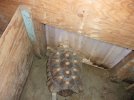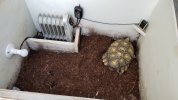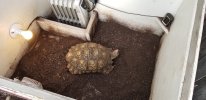As far as I am concerned this subject has been beat to death in my life. However, a possibly new keeper just pm'd me asking about that same subject, and I realize a new keeper is right to have temperature concerns in a cold state, and a new keeper just might be better off getting more than just my opinion. It's been some time now since Tom has reamed me for anything so I'm gonna set ground rules...NO fb type insults, just teasin mr. T...I just want your personal experience, and (opinions) lol. and yeah, let's see if those of you with money and a buncha torts tortoises can give an opinion and some experience nicely.
I was just asked by a new person about my experience with keeping tortoises in cold weather, and did it bother me emotionally. So y'all know I keep hot weather tortoises in an area where outside time is limited and just how did I do it...so I told him, and I'm not gonna repeat what I said again...Yes I DO believe in keeping hot torts in cold weather provided they are set up like kings and are put outside at every given opportunity.
This is not "like kings" but pretty good.

Mart Knobbins was set up like a king before she was a she...lol here's my tort shed and I have a couple of rooms with tort enclosures in the house...when weather permits I carry all outside and back in a night. Mary puts herself outside in the morning and back in at 7 pm herself
So let's hear those genuine experiences and humble opinions...
I was just asked by a new person about my experience with keeping tortoises in cold weather, and did it bother me emotionally. So y'all know I keep hot weather tortoises in an area where outside time is limited and just how did I do it...so I told him, and I'm not gonna repeat what I said again...Yes I DO believe in keeping hot torts in cold weather provided they are set up like kings and are put outside at every given opportunity.
This is not "like kings" but pretty good.

Mart Knobbins was set up like a king before she was a she...lol here's my tort shed and I have a couple of rooms with tort enclosures in the house...when weather permits I carry all outside and back in a night. Mary puts herself outside in the morning and back in at 7 pm herself

So let's hear those genuine experiences and humble opinions...











